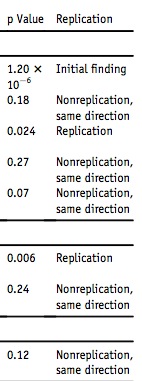Life after GWAS comments
Allen Roses, director of the Deane Drug Discovery Institute at Duke University, noted that GWAS has “largely disappointed its most enthusiastic proponents Continue reading Forget about genes V
Life after GWAS comments
Allen Roses, director of the Deane Drug Discovery Institute at Duke University, noted that GWAS has “largely disappointed its most enthusiastic proponents Continue reading Forget about genes V
Macosxhints provides a nice solution that I have only slightly edited here
|wj_ppt.txt|
et voilÃ

I have recently argued that much of the”obesity epidemic (which even expands now due to the economic crisis) is being due to processed food that fools our sensory system. A new paper (doi:10.1089/omi.2008.0031) now gives me some more support
Taste perception plays a key role in determining individual food preferences and dietary habits. Individual differences in bitter, sweet, umami, sour, or salty taste perception may influence dietary habits, affecting nutritional status and nutrition-related chronic disease risk. In addition to these traditional taste modalities there is growing evidence that “fat taste†may represent a sixth modality. Continue reading Fat receptor leading to obesity?
In principle, there are two methods marrying R and Plink – either by Applecscript or by TCP IP. I prefer the last one; the Plink website now as a nice documentation how to do that. Unfortunately I didn’ get the Rserve process running under OS X. Here is the trick – add the correct “args” option from the example below.

Here comes probably one of the first papers that say NO to a gene for depression. As expected it is a meta-analysis:
Contrary to a previous report, an analysis of 14 previous studies does not find an association between a serotonin transporter gene variation, stressful life events, and an increased risk of major depression … “A more serious concern … is that the findings of this [Caspi et al] and other nonreplicated genetic associations are now being translated to a range of clinical, legal, research, and social settings such as forensics, diagnostic testing, study participants, and the general public. It is critical that health practitioners and scientists in other disciplines recognize the importance of replication of such findings.”
no stool test;-) nothing!
This seems to be a question with not so many good answers. “The origins of genome architecture” (Sinauer, 2007) has a nice chapter on “Genes in pieces” covering
Mechanisms about intron gain center about AGGT tetramer duplication that result in new splice sites —AG|gt … ag|GT— with the segment in lower cases being the new intron. (What I found a funny fact, when working for the first time with genomic sequences around 1994 is the “codon ignorance” and “domain ignorance” of introns while on the other hand allowing for alternative splicing). Another mechanism of intron gain may be transposable elements although retrotransposons cannot deliver introns as they are spliced out. More likely are already released introns and ectopic reintegration. Another (not mentioned mechanism) could be random mutations activating cryptic splice sites.
The key question remains Continue reading Why do we possess introns?
When I could not replicate results from original data of a recent study I thought this to be my private problem. It seems, however, that I am not alone here when reading another reanalysis attempt:
We reproduced two analyses in principle and six partially or with some discrepancies; ten could not be reproduced.
Continue reading I can not confirm that
Here is another opinion from a widely read German magazine (Spiegel online, 25. Mai 2009, Jörg Blech, Wahrsager im Labor) about our too great expectations in genetics:
Während die einen noch mehr und noch größere Vergleichsstudien fordern, halten Skeptiker wie Goldstein dies für reine Zeitverschwendung: “Wenn man 30.000 Patienten mit Diabetes Typ 2 untersucht hat, dann halte ich es für sinnlos, die Zahl auf 60.000 oder 100.000 zu erhöhen.”
good bye to the “common variant hypothesis”!
Blood pressure seems to have a complicated regulation according to a recent nature medicine editorial
If you ask a physiologist what organs are involved in blood pressure regulation, you will probably be told the kidney, the brain or the blood vessels. The kidney is responsible for handling sodium … The brain integrates afferent signals from peripheral sites such as the kidney … systemic vascular resistance is elevated in almost all adults with hypertension, suggesting that arteriolar vasoconstriction has an important role in this disease.
The editorial accompanies a new mechanistic report how a high-salt diet leads to interstitial hypertonic Na+ accumulation by activation of tonicity-responsive enhancer binding protein (TonEBP) binding the promoter of the gene encoding vascular endothelial growth factor-C (VEGF-C). As far, as good, Continue reading Forget about genes II
An AJHG paper that is already resting some longer time on my desk says that
Nonsense SNPs introduce premature termination codons into genes and can result in the absence of a gene product … Continue reading Forget about genes I
 |
Isn’t that a funny new category as reported in the last asthma genome scan – “same direction”? Should that provide evidence that isn’t there? Of 10 samples only one replicates (FHS) and one shows borderline (COP) association to PDE4D / rs 1588265.
yea, yea. |
The judge at the highest court in Germany Hans-Jürgen Papiersaid in an interview last week
Wir stellen nicht erst seit gestern fest, dass dem Grundrecht auf Datenschutz nicht nur von staatlicher, sondern auch von privater Seite Gefahren drohen können
What will happen once my genome once it is on “medical” hardware? Is it as save as the 8,257,378 Virginian patient records that are now under ransom? Continue reading Security of genetic data
Campbell writing at Edge about Maddox
Despite his original establishment of the peer-review process at Nature, Maddox always had strong reservations about its conservatism. These were perhaps best reflected in his view that the Watson and Crick paper on the structure of DNA wouldn’t pass muster under the current system. That paper was published as a result of recommendations by Lawrence Bragg Continue reading Publishing on the recommendations of the head of the authors’ lab
Here comes an update of the Lucifer post as there are new books on the market. Some want to understand (like Arendt or Amery) while others (like Nietzsche and Sartre) would strongly oppose. I am somewhere betweenboth parties with an increasing tendency to explain human (and corporate) behavior by social group pressure while there is still room by inborn personal differences. Continue reading Is evil contagious?
Spiegel online has an excellent report about mirror neurons, empathy, social background and research (taking up a theme in the ZEIT 2003)
“In unserer Kultur sind am erfolgreichsten die”, sagt Gruen, “die am meisten von ihren Gefühlen, von der Fähigkeit zum Mitgefühl abgeschnitten sind.”
Continue reading Mirror neurons and science careers